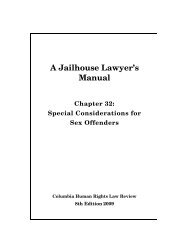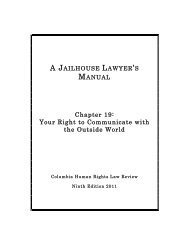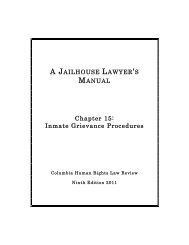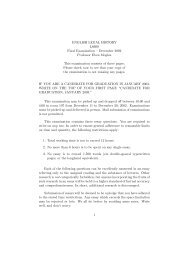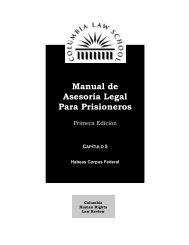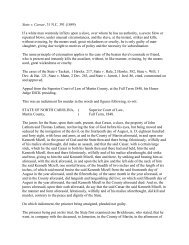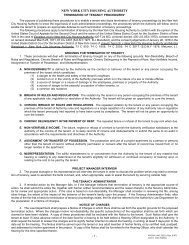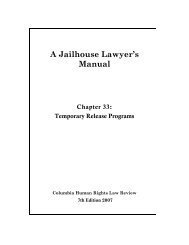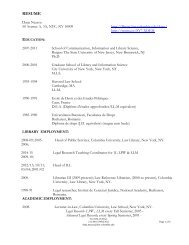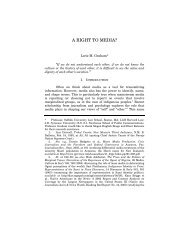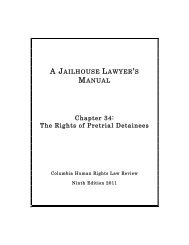The Right to Dignity Rex D. Glensy - Columbia Law School
The Right to Dignity Rex D. Glensy - Columbia Law School
The Right to Dignity Rex D. Glensy - Columbia Law School
You also want an ePaper? Increase the reach of your titles
YUMPU automatically turns print PDFs into web optimized ePapers that Google loves.
2011] <strong>The</strong> <strong>Right</strong> <strong>to</strong> <strong>Dignity</strong> 95<br />
basic substantive legal rights and attributes traditionally associated<br />
with marriage . . . are so integral <strong>to</strong> an individual’s liberty and<br />
personal au<strong>to</strong>nomy” that these “core substantive rights include . . .<br />
the opportunity of an individual <strong>to</strong> establish—with the person with<br />
whom the individual has chosen <strong>to</strong> share his or her life—an officially<br />
recognized and protected family possessing mutual rights and<br />
responsibilities and entitled <strong>to</strong> the same respect and dignity accorded<br />
a union traditionally designated as marriage.” 142 Following this<br />
corners<strong>to</strong>ne statement on the role of dignity as a substantive right,<br />
the court elaborated:<br />
One of the core elements of the right <strong>to</strong> establish an<br />
officially recognized family that is embodied in the<br />
California constitutional right <strong>to</strong> marry is a couple’s<br />
right <strong>to</strong> have their family relationship accorded<br />
dignity and respect equal <strong>to</strong> that accorded other<br />
officially recognized families, and assigning a<br />
different designation for the family relationship of<br />
samesex couples while reserving the his<strong>to</strong>ric<br />
designation of “marriage” exclusively for oppositesex<br />
couples poses at least a serious risk of denying the<br />
family relationship of samesex couples such equal<br />
dignity and respect. 143<br />
<strong>The</strong> use of dignity by the California Supreme Court has two<br />
elements, equally forceful and equally fundamental <strong>to</strong> an<br />
understanding of what the con<strong>to</strong>urs of dignity rights might entail in<br />
the United States. <strong>The</strong> first element equates dignity with<br />
validation—the respect due by virtue of having a certain status—in<br />
this case, that status of being married. <strong>The</strong> second element couples<br />
dignity with equal opportunity, i.e., that everyone ought <strong>to</strong> have the<br />
right <strong>to</strong> achieve that status acquired by the first element. Thus, in<br />
this context, dignity is not only something that the state should be<br />
prevented from denigrating, but it is something that the state should<br />
actively foster. Marriage, with its indicia or respectability and<br />
stability is thus integral <strong>to</strong> a dignified expression of a common<br />
humanity. <strong>The</strong> California Supreme Court’s use of dignity is thus a<br />
fusion of the meanings used by the authors of <strong>The</strong> Federalist Papers 144<br />
on the one hand and the neoKantians 145 on the other, and represents<br />
a novel way for the United States <strong>to</strong> give shape <strong>to</strong> dignity rights.<br />
142. Id. at 399.<br />
143. Id. at 400.<br />
144. See infra section II.A.<br />
145. See infra section II.A.



